

· By James
Top RV Internet Options for 2025 | Stay Connected On the Road
Hitting the Road, Staying Connected: Choosing the Right RV Internet
Staying connected on the road is crucial for RV living and travel. This listicle presents eight essential tools for reliable RV internet access, helping you work remotely, stream entertainment, and stay in touch wherever your adventures take you. These options address the common connectivity challenges RVers face, providing solutions for various budgets and data needs. Discover the best RV internet options, from mobile hotspots to signal boosters and high-speed satellite internet, including options like SwiftNet Wifi designed for rural connectivity.
1. SwiftNet Wifi
Staying connected on the road is no longer a luxury but a necessity for many RV travelers. Whether you're working remotely, streaming your favorite shows, or simply staying in touch with loved ones, reliable internet access is crucial. For those venturing beyond the reach of traditional wired connections, finding a consistent and fast internet solution can be a challenge. This is where SwiftNet Wifi aims to make a difference, promising blazing-fast 5G connectivity specifically designed for the unique needs of RV travelers and rural residents struggling with limited internet options. SwiftNet Wifi seeks to bridge the digital divide, offering a lifeline to those in areas underserved by fiber optic services, enabling them to participate fully in the digital world. This makes it a compelling option among the many RV internet options available today.
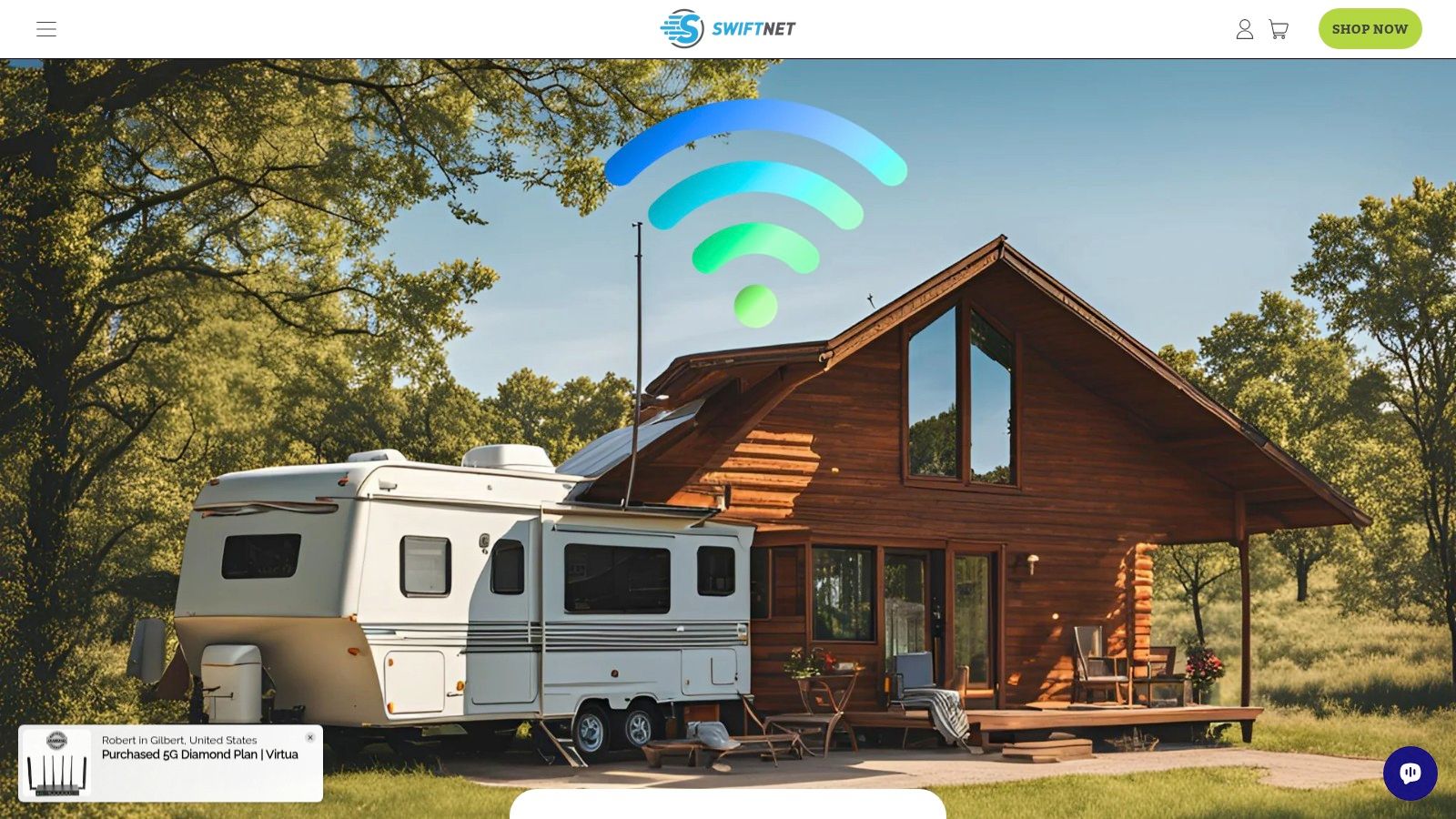
One of the most appealing aspects of SwiftNet Wifi is its focus on 5G technology. This allows for significantly faster speeds and lower latency compared to older 4G LTE networks, making it ideal for data-intensive activities like video conferencing, online gaming, and streaming high-definition content. Imagine working seamlessly from your RV parked overlooking a breathtaking mountain vista, or enjoying a movie night without the frustration of buffering. SwiftNet Wifi aims to make these scenarios a reality, transforming your RV into a truly mobile office or entertainment center. This focus on 5G for RV internet options sets it apart from many competitors still relying on older technologies.
SwiftNet Wifi is particularly beneficial for those in rural areas where traditional internet infrastructure like cable or fiber optic is limited or unavailable. It empowers rural residents and RV travelers alike to stay connected, access essential online services, and participate in the growing digital economy. For remote workers, this means the freedom to choose their workspace and live a more flexible lifestyle. For rural residents, it provides access to telehealth services, online education, and a wider range of entertainment options. SwiftNet Wifi opens up a world of possibilities, bridging the connectivity gap and bringing the benefits of high-speed internet to underserved communities. This makes it a strong contender when considering different rv internet options.
While SwiftNet Wifi presents a promising solution for RV internet options, there are a few factors to consider. The company’s website currently lacks specific pricing information, requiring potential customers to contact them directly for details. This lack of transparency can be a hurdle for those comparing different providers and budgeting for their internet needs. Additionally, while the company highlights its focus on 5G and performance in rural areas, there are limited customer testimonials or independent reviews readily available to verify these claims. Prospective users might benefit from seeking out user experiences or further information on coverage and performance in their specific travel areas.
Setting up SwiftNet Wifi is likely to be similar to other mobile hotspot devices. While specific details aren't readily available, it can be assumed users would need to purchase or lease a compatible 5G modem/router from SwiftNet Wifi. This device would then receive the 5G signal and create a Wi-Fi network within your RV, allowing multiple devices to connect. Ideally, the setup process would be straightforward and user-friendly, minimizing technical hurdles for those less familiar with networking equipment.
SwiftNet Wifi offers a compelling proposition for RV travelers and rural residents seeking reliable and high-speed internet. Its focus on 5G technology and commitment to serving underserved areas makes it a valuable option in the increasingly competitive landscape of rv internet options. However, the lack of readily available pricing information and limited customer reviews are factors to consider before committing to the service. As SwiftNet Wifi continues to develop and expand its network, it will be interesting to see how they address these areas and solidify their position as a leading provider of rural and mobile internet solutions. If you’re seeking a fast and reliable connection on the road or in a remote location, SwiftNet Wifi is definitely worth investigating further. You’ll want to contact them directly for specific pricing and coverage details to see if it’s the right fit for your rv internet options needs.
2. Starlink Mobile
For RV enthusiasts seeking a reliable and high-speed internet connection regardless of location, Starlink Mobile stands out as a game-changer among rv internet options. Developed by SpaceX, this satellite internet service leverages a network of low Earth orbit (LEO) satellites to provide coverage across most of North America, expanding globally, and offering a compelling solution for both stationary and mobile connectivity needs. Unlike traditional satellite internet, Starlink's LEO satellite network offers significantly lower latency, making it suitable for activities like video conferencing and online gaming, previously challenging with traditional satellite services.
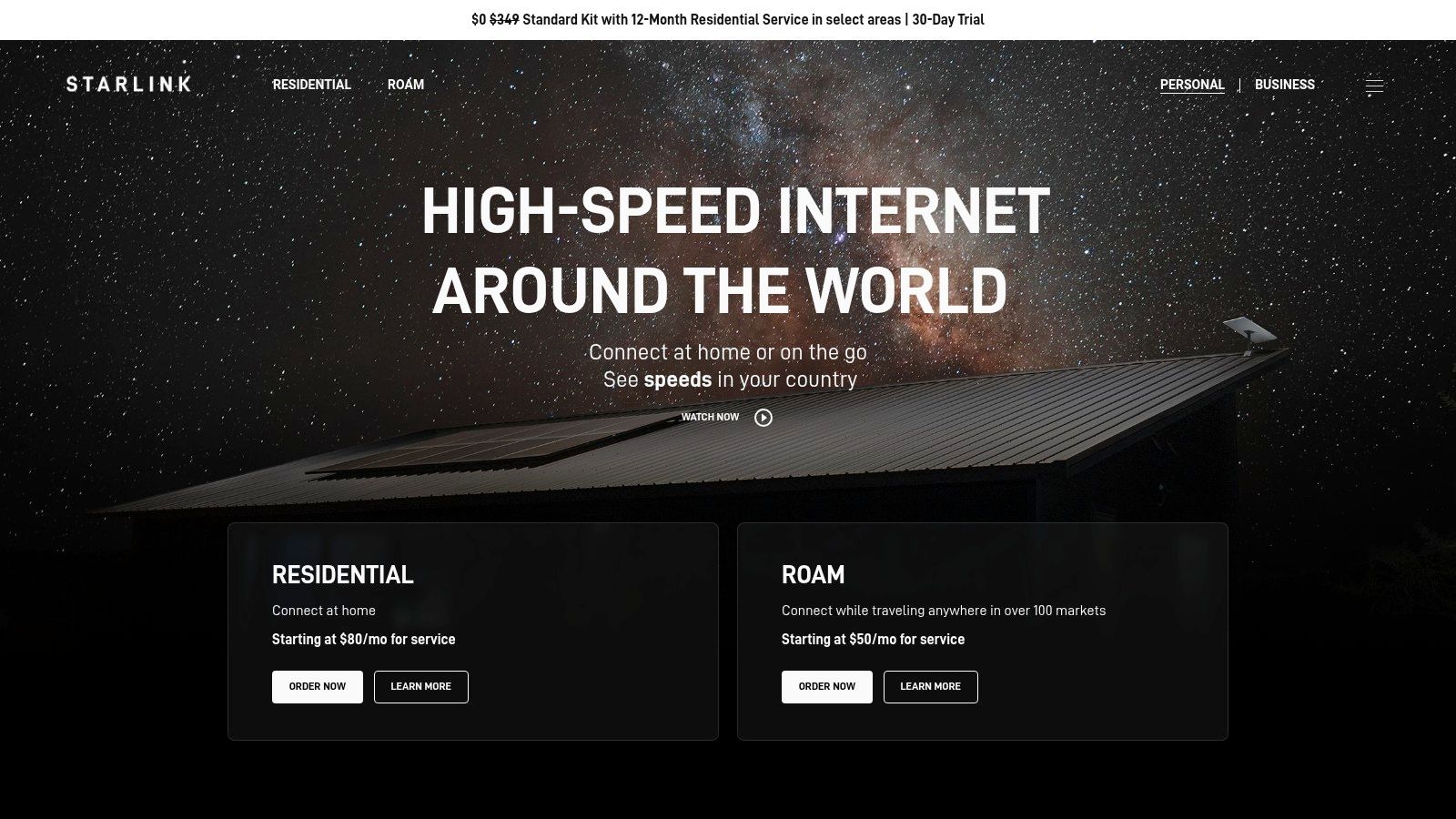
Starlink offers two plans specifically tailored for RV use. Starlink Roam (formerly RV) is designed for stationary use, offering prioritized service at your registered service address and basic service everywhere else within the same continent. If you plan to park your RV for extended periods in one location, Roam is a cost-effective choice. Starlink Mobile, on the other hand, allows for true in-motion connectivity, enabling seamless internet access while driving. This opens up a world of possibilities for digital nomads, full-time RVers, and anyone who needs reliable internet access on the go. This flexibility makes it one of the most versatile rv internet options available today.
One of the biggest advantages of Starlink is its ability to deliver high-speed internet in remote areas where cell service and traditional internet infrastructure are nonexistent. With download speeds up to 100 Mbps and upload speeds up to 15 Mbps, Starlink provides performance comparable to terrestrial broadband connections. This makes it ideal for RVers who work remotely, stream movies, or require a robust internet connection for other data-intensive tasks. The low latency of 20-40ms also ensures a smooth online experience, particularly beneficial for video calls and online gaming. Furthermore, Starlink doesn't impose data caps or throttling, allowing users to enjoy unlimited internet access without worrying about overage charges or slowdowns.
Setting up Starlink is remarkably easy, thanks to its self-installing dish and user-friendly mobile app. The dish automatically acquires a connection to the Starlink satellite network, and the app guides users through the setup process. This portability is a major boon for RVers who frequently change locations. For a more in-depth look at the installation process, you can learn more about Starlink Mobile.
While Starlink offers significant advantages, it's important to consider the costs involved. The upfront equipment cost is $599 for the hardware, and monthly service fees range from $120 for the Roam plan to $250 for the Mobile plan, making it a more premium option compared to other rv internet options. Another crucial requirement is a clear view of the sky for the dish to connect to the satellites. Obstructions like trees or buildings can impede the signal and affect performance. Finally, while Starlink generally provides high speeds, service can be deprioritized during periods of network congestion, particularly in densely populated areas. This is especially true for the Roam plan when not at your registered service address.
Despite these drawbacks, Starlink's combination of high speed, low latency, portability, and extensive coverage makes it a powerful rv internet option for those who prioritize reliable connectivity on the road, especially in areas where other options are limited. For RVers seeking a true "connect anywhere" solution, the investment in Starlink may be well worth the cost. It offers the ability to work, stream, and stay connected no matter how remote your adventure takes you, a crucial feature for those who embrace the RV lifestyle for work or leisure.
3. Verizon Jetpack MiFi 8800L
For RV travelers seeking a reliable and convenient internet connection on the go, the Verizon Jetpack MiFi 8800L stands out as a robust rv internet option. This flagship mobile hotspot device leverages Verizon's expansive 4G LTE network to create a private Wi-Fi network, catering to digital nomads, remote workers, and anyone needing consistent internet access while traveling. It’s particularly well-suited for those already within the Verizon ecosystem or those who prioritize coverage over absolute speed.
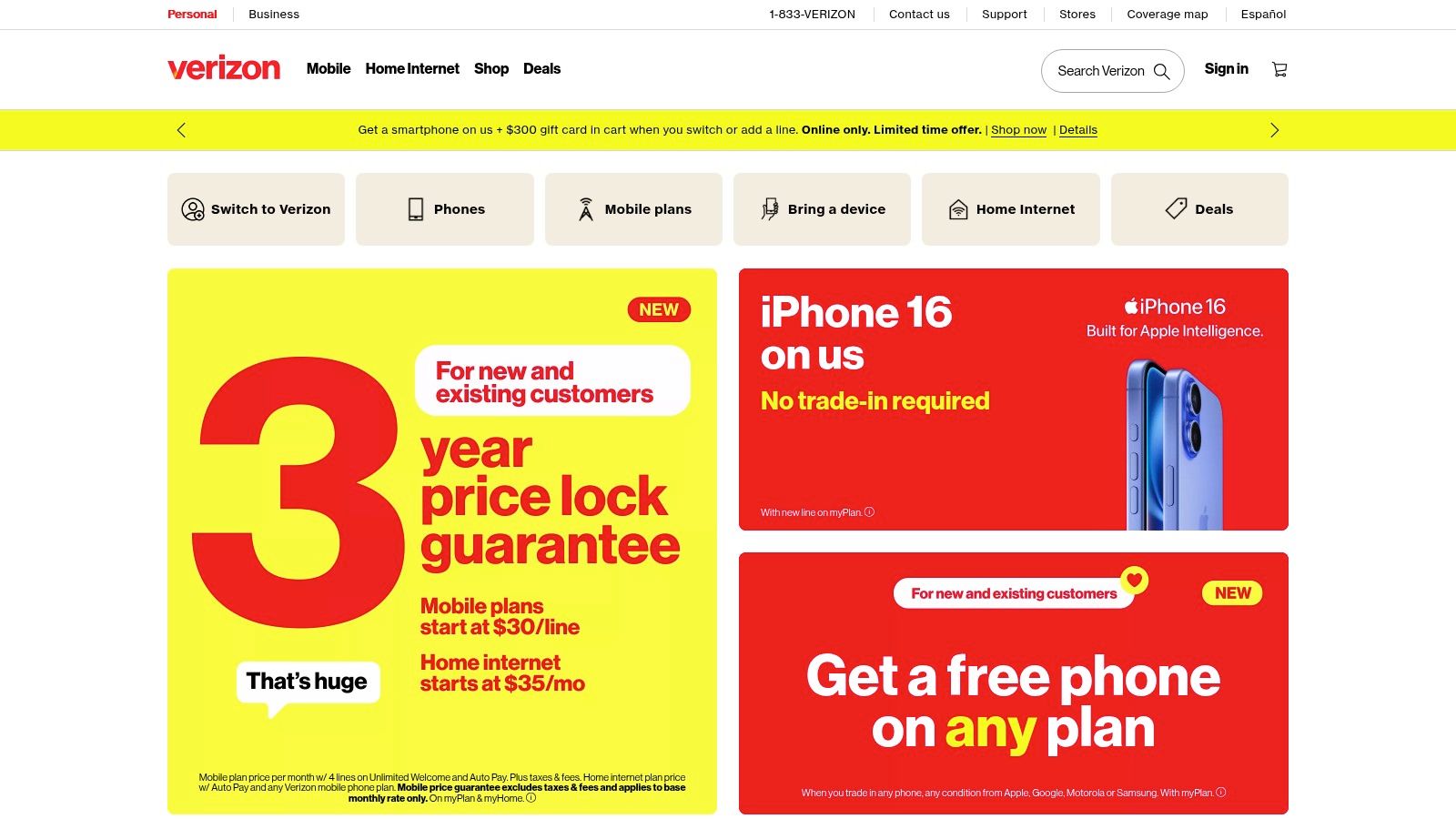
The MiFi 8800L is designed with mobility in mind. Its compact size makes it easy to pack and carry, while the impressive 24-hour battery life, powered by a 4400mAh battery, ensures you stay connected throughout the day. This long battery life is crucial for extended trips, allowing you to work, stream, and stay connected without constantly searching for a power outlet. It also boasts the ability to connect up to 15 devices simultaneously, making it ideal for families or groups traveling together. Whether everyone needs to connect their laptops for work or stream movies on their tablets, the MiFi 8800L can handle the load.
One of the biggest advantages of the Verizon Jetpack MiFi 8800L is its reliance on Verizon's network, renowned for its extensive coverage. This is particularly beneficial for RV travelers who often venture outside of major cities and into areas with limited internet infrastructure. While other rv internet options might falter, the MiFi 8800L can provide a consistent connection, making it a reliable choice for staying connected on the road. Furthermore, the device features external antenna ports, allowing you to boost the signal strength in areas with weaker reception, a significant advantage for those exploring remote locations. You can find more insights about the device and its features. Learn more about Verizon Jetpack MiFi 8800L
The user-friendly touchscreen interface simplifies setup and management, even for those less tech-savvy. You can easily monitor data usage, adjust settings, and manage connected devices directly from the device's screen. Additionally, the MiFi 8800L offers global roaming capabilities, making it a versatile option for international travel.
However, the MiFi 8800L isn’t without its drawbacks. Data plans for the device can be expensive, especially if you require a large amount of high-speed data. Like most cellular data plans, Verizon throttles speeds after you reach your high-speed data allowance, which can significantly impact streaming and other data-intensive activities. Also, performance is inherently tied to cell tower proximity. While Verizon’s network is extensive, you might still experience slowdowns or connection issues in areas with weak signal strength. The device itself also costs around $200, which is a significant upfront investment.
Compared to other mobile hotspots, the MiFi 8800L's strength lies in its combination of robust features, long battery life, and access to Verizon's reliable network. While some newer 5G hotspots might offer faster speeds, the 8800L's 4G LTE speeds of up to 150 Mbps download are generally sufficient for most RV travelers' needs. For setup, simply insert a Verizon SIM card with an active data plan, power on the device, and connect your devices to the generated Wi-Fi network. The intuitive interface guides you through the initial setup process.
In conclusion, the Verizon Jetpack MiFi 8800L is a compelling rv internet option for those prioritizing reliable connectivity and extensive coverage. Its long battery life, multiple device support, and user-friendly interface make it a practical solution for staying connected on the road. While data costs and potential throttling should be considered, the MiFi 8800L's strengths make it a valuable tool for RV travelers seeking a consistent internet experience. You can explore the device and available plans further on the official Verizon website: https://www.verizon.com
4. AT&T MiFi 8000 Mobile Hotspot
The AT&T MiFi 8000 Mobile Hotspot is a strong contender among the best RV internet options, offering a blend of convenience, performance, and coverage, making it a suitable choice for those seeking reliable connectivity on the road. If you're considering different rv internet options, the MiFi 8000 deserves a close look. It leverages AT&T's extensive 4G LTE network, providing a solid connection for RVers working remotely, streaming entertainment, or staying connected with loved ones. This mobile hotspot solution allows you to connect multiple devices simultaneously, essentially transforming your RV into a mobile office or entertainment hub.
One of the key advantages of the AT&T MiFi 8000 is its wide network coverage. AT&T boasts one of the largest networks in the United States, reaching many rural areas where other rv internet options, like fixed wireless or satellite internet, might be less reliable or unavailable. This extensive coverage is crucial for RVers traversing various locations, ensuring consistent connectivity throughout their travels. While 5G home internet options are becoming increasingly available, they often lack the mobility and flexibility offered by a mobile hotspot for RV living.
The MiFi 8000 supports 4G LTE connectivity with speeds up to 150 Mbps, sufficient for most online activities, including video streaming and video conferencing. Of course, real-world speeds can vary based on location and network congestion, especially in popular RV destinations or during peak hours. However, compared to other rv internet options like relying solely on campground Wi-Fi, which can be notoriously slow and unreliable, the MiFi 8000 offers a significant upgrade in terms of speed and consistency. For those needing absolutely top-tier speeds, other rv internet options like Starlink might be a better fit, but for many RVers, the MiFi 8000's speeds are more than adequate.
Another benefit is the impressive 18-hour battery life. This allows for extended use without needing to constantly recharge, a significant plus for RVers spending time off-grid or boondocking. You can comfortably work, stream, or browse throughout the day without worrying about your connection dropping due to a dead battery. The device also supports up to 15 simultaneous Wi-Fi connections, perfect for families or groups traveling together. Features like guest network capability and usage monitoring add further value, providing control and security over your mobile network. The easy setup and management further enhance user experience, making it a user-friendly option even for those less tech-savvy.
The AT&T MiFi 8000 also offers various data plan options to suit different usage needs and budgets. From smaller data allowances for light users to unlimited plans for heavy data consumers, you can choose a plan that aligns with your specific rv internet requirements. Pricing for these plans can be found on the AT&T website (https://www.att.com). While unlimited plans can be expensive, the flexibility of choosing a plan based on your predicted usage is a significant advantage compared to some other rv internet options with less flexible data allowances.
However, potential downsides need consideration. While AT&T’s network is extensive, data speeds can fluctuate depending on location. Network congestion can also impact performance, especially in crowded areas. International roaming options are limited, making it less suitable for international travel. Furthermore, as with any cellular-based rv internet option, the MiFi 8000's performance is inherently tied to cellular signal strength. In areas with weak or no signal, the device will be ineffective.
Implementation is straightforward. Simply purchase the device and a compatible data plan from AT&T. Insert the SIM card, power on the device, and connect your devices to the Wi-Fi network. The MiFi 8000 has a user-friendly interface for managing settings and monitoring data usage. If you’re looking for reliable and convenient rv internet options with good coverage, the AT&T MiFi 8000 Mobile Hotspot is a solid choice worth considering. Its combination of speed, battery life, and ease of use makes it a valuable tool for staying connected on the road.
5. WeBoost Drive Reach RV Cell Signal Booster
For RV travelers seeking a reliable internet connection on the road, cellular data often plays a crucial role. However, venturing off the beaten path frequently means encountering weak or nonexistent cell signals. This is where the WeBoost Drive Reach RV cell signal booster comes in, offering a powerful solution to enhance your RV internet options. This booster excels at amplifying existing cellular signals, ensuring you stay connected even in remote locations. It doesn't create a signal where there is none, but it significantly strengthens weak ones, dramatically expanding your coverage area. This can make the difference between a frustratingly slow connection and a smooth online experience, whether you're streaming movies, working remotely, or simply browsing the web.
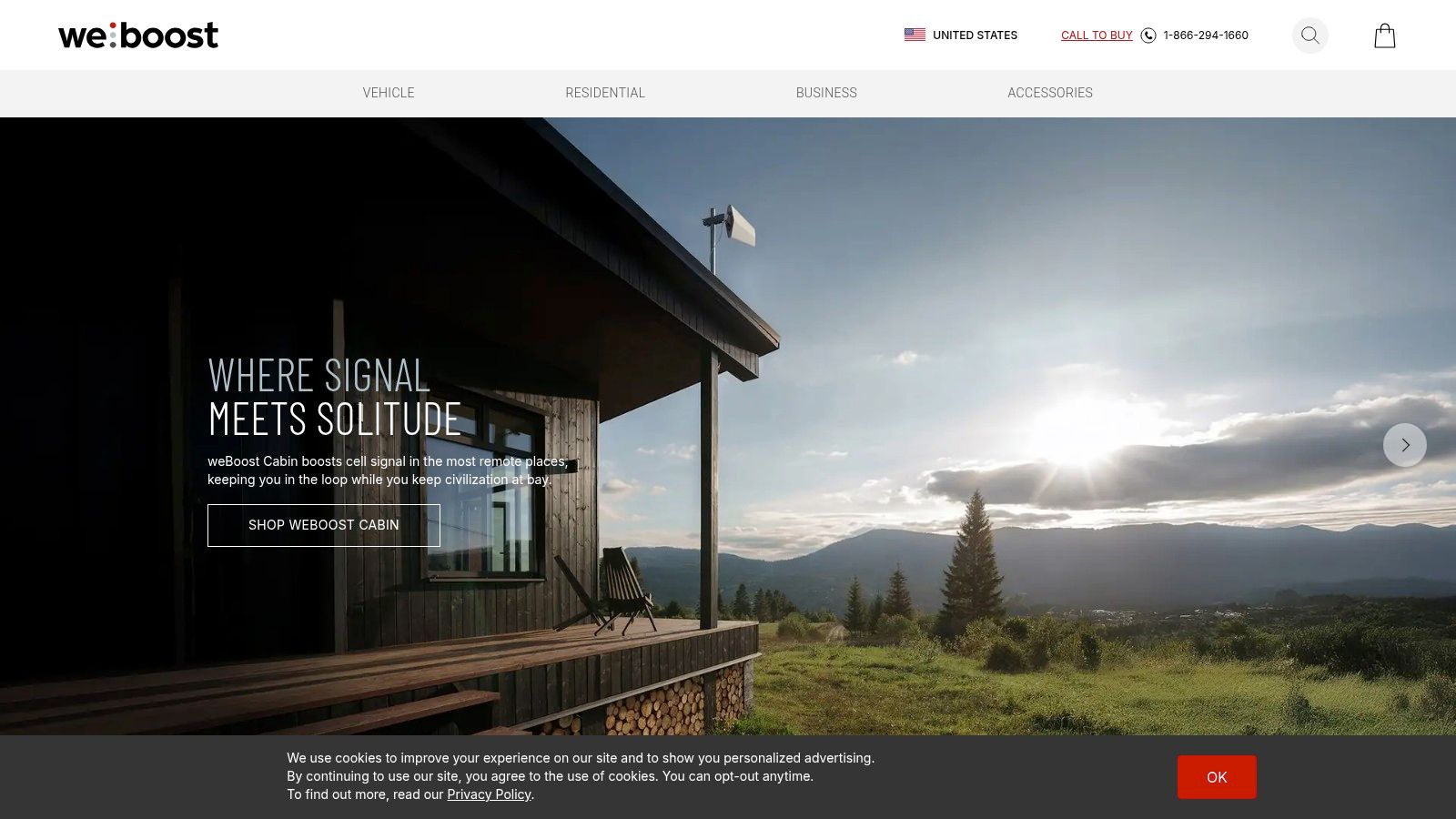
The WeBoost Drive Reach RV is specifically engineered for RVs and larger vehicles, boasting a powerful 50dB gain amplification across all carriers. This means improved signal strength for everyone in your RV, regardless of their mobile provider. With coverage up to 1,800 sq ft inside your RV, you can enjoy a consistently strong signal throughout your mobile home. This wide coverage is particularly beneficial for larger RVs or those traveling with multiple devices that require internet access. The booster works with all cellular devices simultaneously, eliminating the need for individual boosters and simplifying your setup. Automatic gain control prevents interference and ensures optimal performance, adapting to fluctuating signal strengths as you travel. The WeBoost Drive Reach offers a permanent installation with professional-grade components, designed for long-term reliability and consistent performance throughout your RV adventures.
One of the key advantages of the WeBoost Drive Reach is its ability to bolster signals across all carriers. This makes it an ideal rv internet option for families or groups traveling together who might use different providers. It's also a significant benefit for those who travel extensively, as it eliminates the need to switch boosters depending on the dominant carrier in a particular area. By amplifying existing signals, the Drive Reach significantly extends the usable range of cellular service, allowing you to stay connected in areas where you would typically lose service. This enhanced connectivity translates to fewer dropped calls, improved data speeds, and a more reliable internet connection for all your online activities.
While the WeBoost Drive Reach offers significant advantages for boosting your RV internet options, it's important to be aware of its drawbacks. The most significant is the high upfront cost, typically ranging from $500 to $600. It also requires professional installation, adding to the overall expense. It's crucial to remember that the Drive Reach only amplifies existing signals; it cannot create a signal where there is none. If you're traveling in an area with absolutely no cellular coverage, the booster won't be able to help. Finally, the installation process may require external antenna mounting, which could involve some effort and expertise.
Despite these considerations, the WeBoost Drive Reach remains a top contender for those prioritizing reliable cellular connectivity in their RV. Its powerful amplification, broad carrier compatibility, and wide coverage area make it a valuable investment for serious RV travelers. If you're tired of struggling with weak cell signals and unreliable internet on the road, the WeBoost Drive Reach might be the solution you've been searching for. You can learn more about WeBoost Drive Reach RV Cell Signal Booster for a more in-depth understanding of its features and benefits. You can also find more information on their website: https://www.weboost.com. This investment can greatly enhance your rv internet options and keep you connected wherever your travels take you.
6. KING WiFiMax Wi-Fi Range Extender
For RV travelers seeking a cost-effective way to boost weak campground Wi-Fi or leverage free public networks, the KING WiFiMax Wi-Fi Range Extender presents a compelling solution among the various rv internet options. This powerful device is designed specifically for the mobile lifestyle, capturing and amplifying distant Wi-Fi signals, effectively extending your internet reach. Unlike cellular-based solutions or satellite internet, the WiFiMax leverages existing infrastructure, making it a budget-friendly option for staying connected on the road.
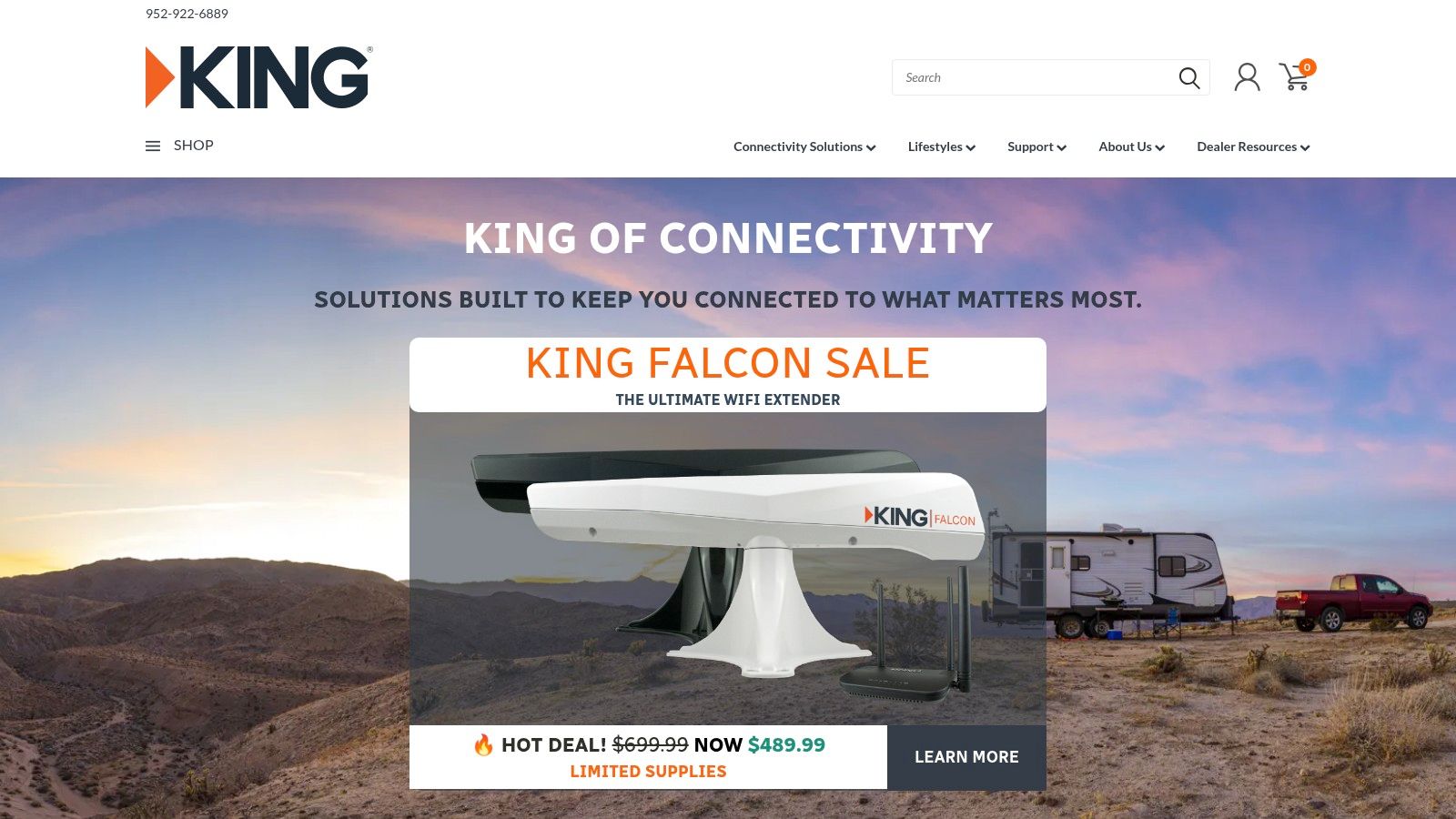
The KING WiFiMax distinguishes itself with its high-gain directional antenna system, capable of extending Wi-Fi range up to an impressive one mile in ideal conditions. This makes it significantly more powerful than standard Wi-Fi extenders designed for home use. The weather-resistant outdoor unit ensures durability and reliable performance even in challenging weather conditions, a critical factor for RV use. The device supports multiple device connections, allowing everyone in your RV to benefit from the extended range. Furthermore, the straightforward setup process, facilitated by a user-friendly smartphone app, ensures even tech-novices can quickly get online.
While pricing information isn't readily available on the manufacturer's website, similar high-gain Wi-Fi extenders typically fall within the $100-$300 range. This represents a one-time cost compared to the recurring monthly fees associated with cellular or satellite internet plans. This makes the KING WiFiMax a potentially attractive option for budget-conscious RVers. Technical requirements are minimal – all you need is a detectable Wi-Fi signal within range and devices capable of connecting to a Wi-Fi network.
Compared to other rv internet options like cellular boosters, the KING WiFiMax offers a distinct advantage by not requiring a cellular data plan. However, unlike solutions like Starlink, which provides its own satellite-based internet connection, the WiFiMax's performance is inherently tied to the availability and quality of existing Wi-Fi networks. While it excels at extending the range of these networks, it cannot create a signal where none exists. For example, if you're boondocking in a remote area with no accessible Wi-Fi, the WiFiMax won’t be of much use. In such situations, a cellular booster or satellite internet system would be necessary.
Implementing the KING WiFiMax typically involves mounting the outdoor unit on your RV’s roof for optimal signal reception. This provides a clear line of sight to distant Wi-Fi sources, maximizing range and performance. The unit then connects to your existing RV’s internal Wi-Fi network, effectively extending its reach. The setup process is typically guided by the smartphone app, simplifying installation and configuration.
For RV travelers, digital nomads, and those living in rural areas with limited internet options, the KING WiFiMax can be a valuable tool. Its ability to extend the reach of existing Wi-Fi networks makes it a cost-effective solution for accessing free Wi-Fi at campgrounds, libraries, or businesses. It is particularly beneficial for individuals who primarily work online and require a reliable internet connection while traveling or living in areas without fiber optic internet. However, it's crucial to manage expectations, remembering that its effectiveness is ultimately determined by the availability and strength of external Wi-Fi signals. If you frequently find yourself in areas with weak or non-existent Wi-Fi, exploring other rv internet options like cellular or satellite internet might be more suitable. For those seeking to maximize the range and reliability of existing Wi-Fi networks, the KING WiFiMax presents a powerful and practical solution. You can explore further details and potentially purchase the KING WiFiMax through their website: https://www.kingconnect.com.
7. Pepwave MAX Transit Duo
For RV travelers serious about their internet connectivity, the Pepwave MAX Transit Duo represents a top-tier solution. This professional-grade mobile router isn't just another Wi-Fi hotspot; it's a powerful networking hub designed specifically for vehicles and mobile applications. Its robust features and exceptional performance make it a popular choice among digital nomads, remote workers, and RV enthusiasts who demand reliable, high-speed internet access on the go. This router is a strong contender for one of the best rv internet options available.
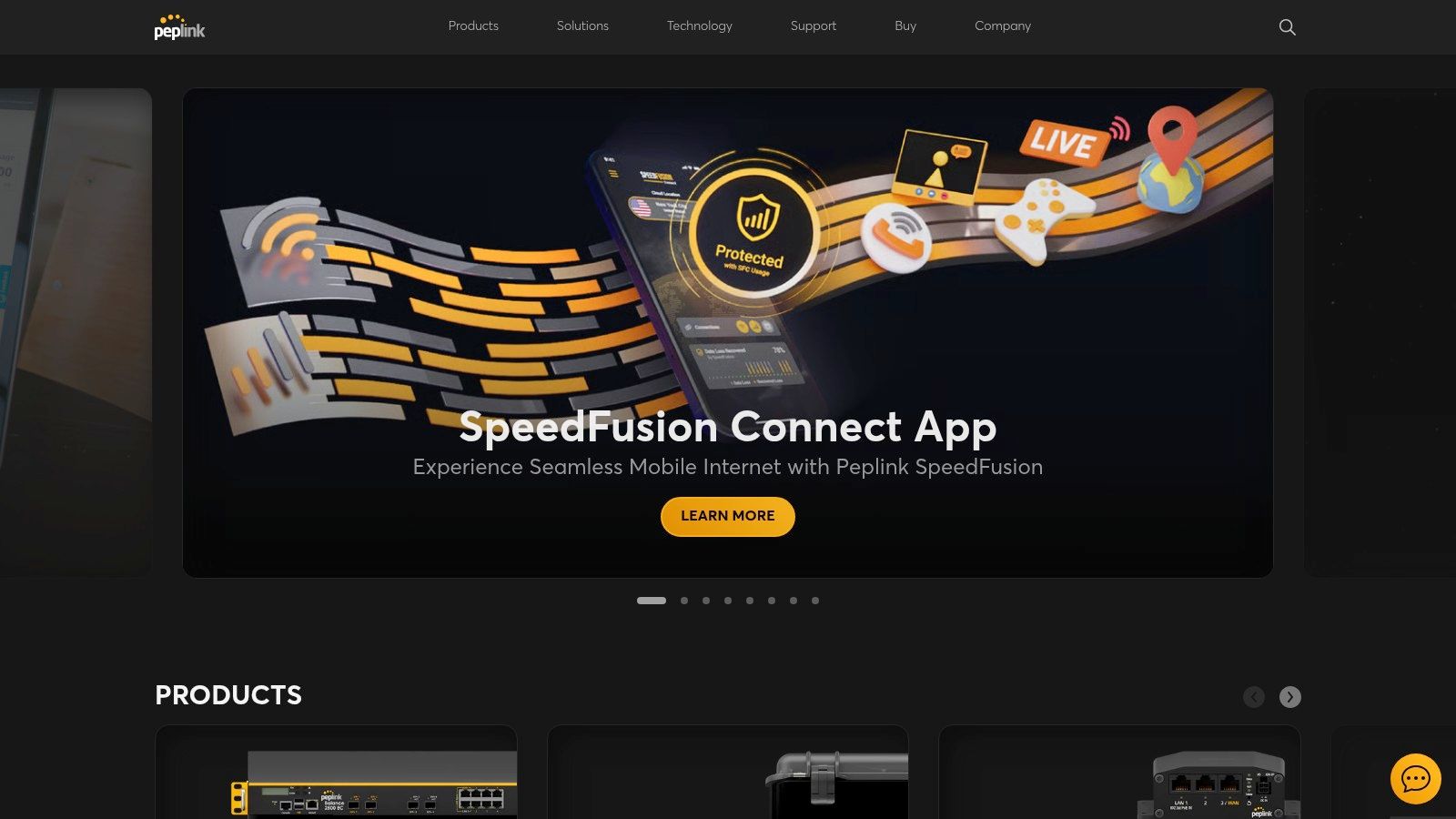
The Pepwave MAX Transit Duo distinguishes itself with its dual embedded cellular modems. This feature unlocks the potential for load balancing and failover capabilities, ensuring consistent connectivity even in areas with fluctuating signal strength. Imagine streaming a movie while uploading large files for work – with load balancing, both tasks run smoothly without interruption. Furthermore, if one cellular connection drops, the failover function automatically switches to the other modem, maintaining your internet access without a hiccup. This redundancy is invaluable for those who rely on the internet for work or critical communication while traveling.
Supporting Cat 12 LTE with speeds up to 600 Mbps, the MAX Transit Duo is built for speed. While real-world speeds vary based on location and network conditions, this capability allows you to take full advantage of high-speed cellular networks where available. Compared to basic mobile hotspots or single-modem routers, the Transit Duo’s performance is a significant upgrade, enabling bandwidth-intensive activities like video conferencing, online gaming, and streaming in high definition. This makes it a highly desirable rv internet option for users with high bandwidth demands.
The advanced antenna diversity options further enhance the Pepwave's performance. The router supports external antennas, allowing you to optimize signal reception in challenging environments. For RV users, this means potentially accessing stronger signals in remote locations or areas with obstructed views of the sky. This flexibility is a key advantage for those who prioritize reliable internet access while exploring off-the-grid destinations.
Beyond its impressive hardware, the Pepwave MAX Transit Duo boasts professional network management features. These features offer granular control over your network, allowing you to prioritize traffic, configure security settings, and monitor data usage. While this level of control can be daunting for casual users, tech-savvy RVers and remote workers will appreciate the ability to fine-tune their network for optimal performance and security.
Of course, this level of performance and functionality comes at a premium. The Pepwave MAX Transit Duo typically costs between $800 and $1000, making it a significant investment. This cost, coupled with the need for separate cellular data plans for each modem, makes it a less suitable option for casual users or those with limited budgets. The setup process can also be complex for average users, requiring some networking knowledge to configure properly. For basic internet needs, simpler and more affordable rv internet options exist.
However, for those who demand the best in mobile internet connectivity, the Pepwave MAX Transit Duo justifies its price tag. Its exceptional reliability, performance, and advanced features make it an ideal choice for demanding RV travelers, mobile professionals, and anyone who needs consistent, high-speed internet access on the road. Its robust build quality ensures durability in a mobile environment, while the multiple carrier support provides flexibility in choosing the best data plans for your needs. If you're looking for a reliable rv internet option for your travels and work needs, and are willing to invest in a top-of-the-line solution, the Pepwave MAX Transit Duo should be at the top of your list. You can explore more about the product and its specifications on their website: https://www.peplink.com
8. T-Mobile 5G Home Internet
For RV travelers seeking a reliable and convenient internet connection, exploring various RV internet options is crucial. T-Mobile 5G Home Internet emerges as a compelling contender, offering a fixed wireless solution that leverages the power of T-Mobile's 5G and 4G LTE networks. This allows RVers to enjoy broadband speeds without being tethered to traditional cable or fiber connections, making it a practical choice for those seeking internet access on the go. This option deserves a spot on our list of RV internet options due to its competitive pricing, unlimited data, and ease of setup, particularly appealing to those who prioritize flexibility and value.
T-Mobile 5G Home Internet is designed to provide stationary internet access, meaning it’s best suited for RVers who park their vehicles for extended periods in one location. It's an excellent solution for those who enjoy "workamping" or staying at RV parks for several weeks or months. Digital nomads, remote workers, and full-time RVers who prioritize consistent internet access for work or entertainment will find this a compelling option. If you're constantly on the move, however, the need to update your service address and potential variations in service quality may make other RV internet options more suitable.
One of the most attractive features of T-Mobile 5G Home Internet is its unlimited data plan. Unlike many other internet providers, T-Mobile doesn't impose data caps or throttle speeds after a certain usage limit. This is a huge benefit for RVers who rely heavily on the internet for streaming movies, video conferencing, or working remotely. You can download large files, participate in online gaming, and stream high-definition content without worrying about overage charges or slowdowns.
The service typically delivers speeds between 25-100+ Mbps, depending on location and network availability. While this isn't as fast as some fiber optic connections, it’s generally sufficient for most online activities. The built-in Wi-Fi 6 router capabilities ensure a strong and reliable signal throughout your RV. You can connect multiple devices simultaneously without experiencing significant performance drops. This is particularly beneficial for families or those traveling with multiple internet-dependent devices.
T-Mobile 5G Home Internet is priced competitively at $50/month, offering considerable value for unlimited data. Furthermore, there are no annual contracts, giving you the flexibility to cancel the service at any time without incurring penalties. This is a significant advantage for RVers who may only need internet access for a portion of the year. The setup process is also incredibly simple. The gateway device is plug-and-play, allowing you to establish an internet connection quickly and easily.
However, it’s crucial to be aware of the potential drawbacks. Speed and availability can vary significantly depending on your location and proximity to a T-Mobile tower. While 5G coverage is expanding rapidly, it's not yet as ubiquitous as 4G LTE. Before subscribing, it's essential to check T-Mobile's coverage map to ensure adequate service at your intended destinations.
Another important consideration is the requirement for a fixed service address. While technically designed for homes, many RVers successfully use the service by registering a friend or family member's address or using a mail forwarding service. However, you may need to update your service address periodically as you move, which can be inconvenient. T-Mobile has been known to flag accounts that frequently change locations, so it’s important to be mindful of their terms of service.
In comparison to other RV internet options like satellite internet or mobile hotspots, T-Mobile 5G Home Internet offers a compelling balance of speed, affordability, and convenience. Satellite internet, while widely available, can be expensive and suffer from high latency. Mobile hotspots, while portable, often have limited data allowances and can be slower than fixed wireless connections.
If you’re considering T-Mobile 5G Home Internet for your RV, it's highly recommended to check coverage availability at your planned destinations. You can do this by visiting the T-Mobile website (https://www.t-mobile.com). Consider using a signal booster to enhance reception in areas with weaker signal strength. For those seeking a reliable, unlimited data internet solution for their RV at a reasonable price, T-Mobile 5G Home Internet presents a viable and attractive option, especially for those embracing a stationary RV lifestyle.
RV Internet Providers & Devices Comparison
| Service / Device | Core Features & Connectivity | User Experience & Quality ★ | Value & Pricing 💰 | Target Audience 👥 | Unique Selling Points ✨ |
|---|---|---|---|---|---|
| 🏆 SwiftNet Wifi | High-speed 5G for rural & RV areas | Reliable in underserved zones | Flexible plans, pricing not public | Rural residents, RV travelers, remote workers | Specialized 5G for hard-to-reach areas |
| Starlink Mobile | 5G satellite, up to 100 Mbps, in-motion | High speeds, no data caps, low latency ★★★★ | High upfront ($599) + $120-$250/mo | RV users needing satellite internet | Mobile use with self-install dish ✨ |
| Verizon Jetpack MiFi 8800L | 4G LTE up to 150 Mbps, 15 devices | Long battery (24h), strong reception ★★★ | Device ~$200 + potentially costly plans | Mobile users needing hotspot | Touchscreen, global roaming |
| AT&T MiFi 8000 | 4G LTE up to 150 Mbps, connects 15 devices | Good battery (18h), wide network ★★★ | Variable plans, can be costly | RVers needing easy hotspot setup | Usage monitoring, guest network |
| WeBoost Drive Reach RV Booster | 50dB gain, covers 1800 sq ft inside RV | FCC approved, reduces dropped calls ★★★★ | High upfront $500-600 + install | RV owners needing stronger cellular signals | Amplifies all carriers, pro-grade install |
| KING WiFiMax Range Extender | Extends Wi-Fi up to 1 mile | Weather-resistant, easy app setup ★★★ | Cost-effective for Wi-Fi access | RVers near campgrounds & public Wi-Fi | High-gain directional antenna |
| Pepwave MAX Transit Duo | Dual LTE modems, load balancing, 600 Mbps | Enterprise-level, reliable, ★★★★ | High cost $800-1000 + data plans | Pro/mobile users needing top performance | Dual modems, advanced networking |
| T-Mobile 5G Home Internet | 5G/4G LTE, unlimited data, Wi-Fi 6 router | Easy setup, no contracts ★★★ | $50/month competitive pricing | Stationary RV users, fixed wireless fans | No throttling, unlimited data |
Staying Connected on the Open Road: Making the Best Choice for Your RV
Finding reliable rv internet options can feel overwhelming with so many choices available. From mobile hotspots like the Verizon Jetpack MiFi 8800L and AT&T MiFi 8000 to satellite internet systems like Starlink Mobile, and cellular boosters such as the WeBoost Drive Reach RV, each solution caters to different needs and budgets. Don't forget the power of extending existing Wi-Fi signals with options like the KING WiFiMax Wi-Fi Range Extender or managing multiple connections with a travel router like the Pepwave MAX Transit Duo. Even home internet solutions like T-Mobile 5G Home Internet can be viable options depending on your RV lifestyle.
The key takeaway is that no single "best" rv internet option exists. Consider your data usage, travel style, and budget when making your decision. Are you a full-time RVer who relies on a consistent connection for work? Starlink Mobile or a robust mobile hotspot plan might be ideal. Do you mostly camp near towns with available Wi-Fi? A Wi-Fi extender and cellular booster could be a cost-effective solution. Research data limits, speeds, and coverage areas for each option before committing.
Implementing your chosen solution also requires some forethought. Mobile hotspots and cellular boosters often require optimal positioning for best performance. Satellite internet systems need clear sky views. Understanding these limitations will significantly improve your online experience. By carefully evaluating the rv internet options presented in this article, you can confidently choose the right tools to stay connected while enjoying the freedom of the open road.
For a seamless and integrated solution that combines multiple internet sources and optimizes your RV's online connectivity, check out SwiftNet Wifi. SwiftNet Wifi offers advanced features to manage various rv internet options and keep you connected on the go. Learn more and experience uninterrupted connectivity at SwiftNet Wifi.

